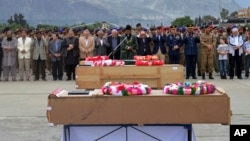A paradise for professional mountaineers and casual tourists alike, Gilgit-Baltistan is famous for being home to the world’s second largest mountain, K-2, and the meeting point of three of the world’s mightiest mountain ranges - the Karakorum, the Hindu Kush, and the Himalayas.
The Pakistan-controlled region is also part of a territorial dispute that has caused several wars between nuclear neighbors India and Pakistan. And billions of dollars in Chinese development projects will likely hinge on a proposed economic corridor that would pass through the region but India opposes.
Indian Prime Minister Narendra Modi’s administration has taken a tough stance on Pakistan, and the temperature between the two neighbors rose again this week as Pakistan held elections for the G-B assembly on Monday.
Vikas Swarup, spokesman for the Indian Ministry of External Affairs, called it a tool of annexation.
"The entire state of Jammu and Kashmir, which includes the regions of Gilgit and Baltistan is an integral part of India,” he said. “The election in Gilgit and Baltistan on June 8 under the so-called Gilgit-Baltistan empowerment and self-governance order is an attempt by Pakistan to camouflage its forceful and illegal occupation of the region."
Pakistan strongly rejected this claim and, in turn, blamed India for deploying over 700,000 military personnel to “occupy” the part of Kashmir under its control.
The Gilgit-Baltistan Empowerment and Self-Governance Order was a presidential decree passed in 2009 by then Pakistani President Asif Ali Zardari. It allowed for the region to have its its own legislative assembly, own governor, and chief minister but did not offer it any representation in the national parliament.
Pakistan’s stance that G-B is part of the disputed Kashmir region is why the country is hesitant to grant it representation on a national level, or the constitutional status of a province.
This lack of representation, however, has created feelings of marginalization in the area and led to a growing demand for autonomy, according to Farman Ali, a G-B journalist and senior editor of The Express Tribune, an English-language daily.
“They seek a sort of internal autonomy to govern themselves and to have a right on their own resources and rule their area,” Ali said.
The stakes have been raised further by Chinese plans to build the China–Pakistan Economic Corridor (CPEC) , a project involving infrastructure and energy projects worth $46 billion. The proposed corridor will extend across the G-B border with the restive Chinese province Xinjiang, and join South China to the Arabian Ocean.
Local leaders complain Pakistan did not involve them in the negotiations over the CPEC, or take the concerns of indigenous communities into account.
This is not the first time China has built a major highway through this area. The Karakoram Highway, the highest paved international road, also runs through G-B along one of the old silk routes from China.
Monday’s elections saw a good turnout of voters, and many of Pakistan’s mainstream political parties participated. Most of them promised the region some sort of status in the federation.
Pakistan Prime Minister Nawaz Sharif has formed a committee to determine how to give G-B a well-defined constitutional status without harming the country’s stance on the Kashmir dispute.
But many locals say considering G-B a part of Kashmir is the biggest part of the problem.




